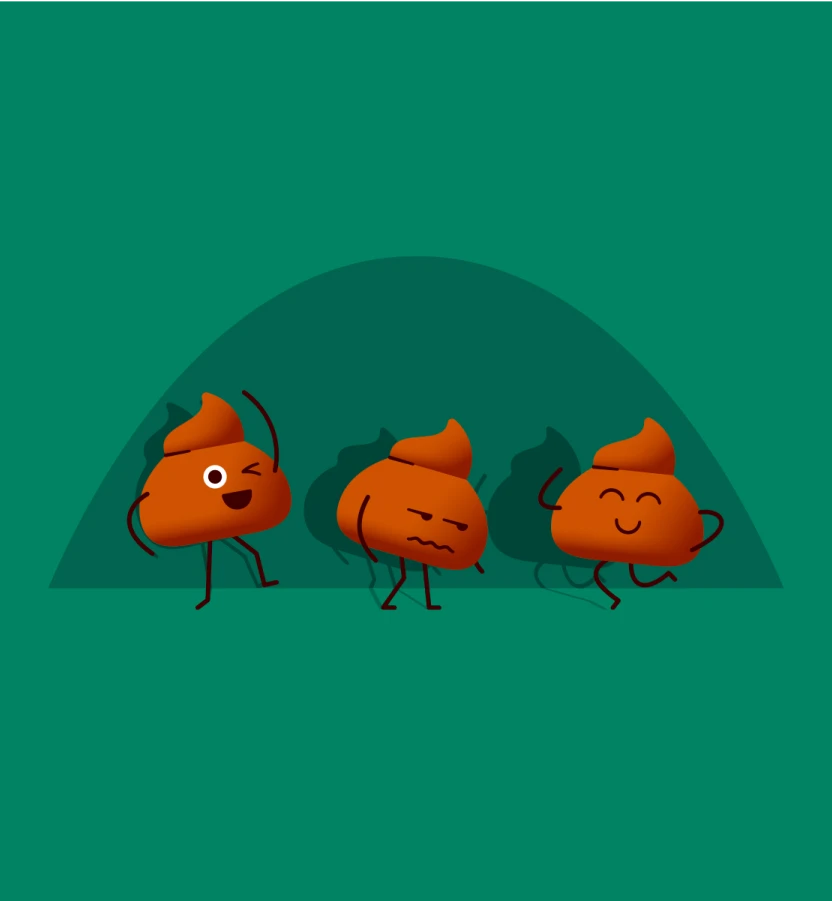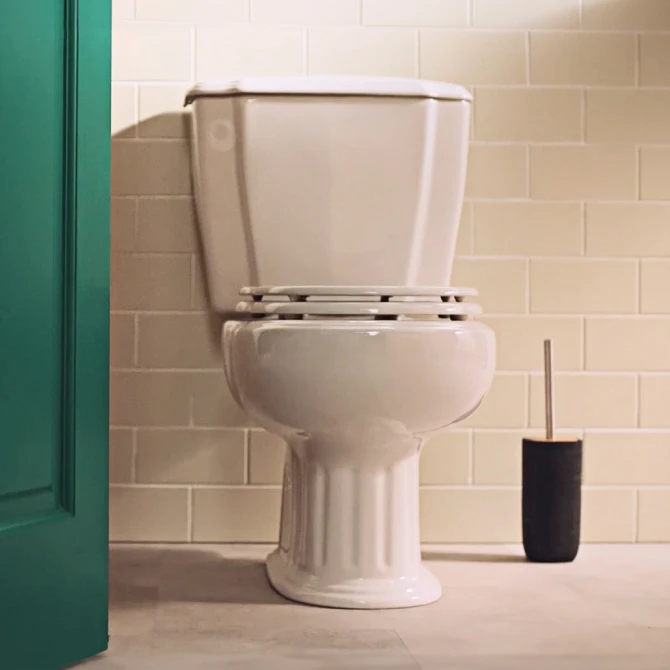
What is constipation?
What exactly is constipation, and how can you manage it? The good news is, if you are experiencing constipation, there are several things you can do to take the power back and regain control of your bowel movements.
Read on to learn more about what exactly constipation is, the potential causes, and what you can do to remedy the sticky situation.
What is constipation?
In simple turns, digestion is the process that turns the tasty food you eat into energy and nutrients to keep your body running 24/7.
The digestive system uses what it needs from your ingested food and eliminates waste through pooing. The process is automatic, or at least, it certainly should be if things are working correctly. But like all well-oiled machines, sometimes digestion can fail. If you’re having trouble passing stools, and those trips to the bathroom are leaving you unfulfilled, which in this case quite literally means ‘filled’, you may be constipated.1
Constipation is commonly defined as having fewer than three bowel movements a week. However, since digestion is unique to each person, you can still feel like you haven't completely emptied your bowels, regardless of if you poop more or less frequently than thrice a week.1
Constipation can be really frustrating, impacting your ability to enjoy life to its fullest.1 The good news, however, is that there are several things you can do to manage it.
How common is constipation?
When constipation lasts for several weeks, it’s considered chronic. Chronic constipation is more likely to develop as you age. Up to one-third of people over 65 struggle with it.1
What causes constipation?2
Medical experts divide constipation into two categories: primary and secondary. Primary constipation manifests when the muscle and nerves in the colon and rectum malfunction, or the brain and digestive system do not communicate properly.
Dietary habits, medications, behavioural issues, hormonal imbalances, and metabolic and neurological disorders can cause secondary constipation.
Medical conditions1
Multiple medical factors can cause constipation.
One is irritable bowel syndrome (IBS), a common disorder affecting the large intestine. People with IBS often experience constipation as one of the symptoms.
Another condition that can lead to constipation is pelvic floor dysfunction, in which the muscles in the pelvic floor are not working together properly. This can also cause difficulty in going to the bathroom.
In rare cases, blockages or structural problems in the colon or rectum may cause constipation as well.
Other medical conditions, such as diabetes, hypothyroidism, Parkinson's disease, and multiple sclerosis, can also contribute to constipation.
Medicines and dietary supplements1
Medications can have unwanted side effects.
The following medications and supplements can cause constipation:
- antihistamines
- antidepressants
- some pain medicines (opioids)
- medication to manage blood pressure
- Parkinson's disease treatments
- calcium and iron supplements
Speak to your GP to understand your medication's side effects so that you can take measures to avoid the complications of constipation or learn more about the link between certain medications and constipation here.
Nutrition, activity, and routine
Fruits and vegetables are particularly rich in fibre. Fibre is essential for digestion, as it helps bind water in your digestive system, and acts as a bulking agent, making pooping a more effortless experience.3
Physical activity can also positively impact how well your colon moves things along. Not everyone likes exercise, but even a short, brisk walk can give your digestive system the boost it needs to clear out your gut.4
Your daily habits may also be the root cause of your constipation. For example, skipping meals, in particular breakfast, can increase your constipation risk. Eating stimulates your colon and helps move waste through your system more efficiently. So, get on that breakfast train, even if it’s just something small like a piece of fruit, and make sure you are eating at regular times daily.3
Symptoms of constipation
Symptoms of constipation include hard stools, straining while you poop, infrequent bowel movements, feelings of incomplete evacuations, bloating, and abdominal pain.
That said, constipation can affect more than just your ability to digest food. It can also disrupt daily life. According to research, 12% of constipated individuals miss work or school, and 60% experience difficulties in being at the top of their game.2,5
How is constipation diagnosed?
If you take just one lesson from this guide, let it be that constipation need not be a burden. If you are concerned that constipation is impacting on your ability to live a normal life, make an appointment with your doctor who can both diagnose and help you make the changes you need, so that constipation can become a thing of the past.
To determine what may be causing your constipation, a doctor will ask questions about your symptoms, medical history, medications, and habits. They may also examine your body to detect any physical problems or blockages, and may need to perform diagnostic tests, like x-rays or other procedures, in order to eliminate the potential of there being more serious root causes to your constipation.1
Prevention & treatment options for constipation
There are several things you can do to treat and prevent constipation.
If simple diet and lifestyle changes don't provide relief, the following over-the-counter medications may help:
Stimulant laxatives
Over-the-counter laxatives may be the answer to your digestive prayers. An example of a gentle treatment to get things moving is Dulcolax, a stimulant laxative. It works by promoting the accumulation of water and activating the muscles in your gut, encouraging them to contract and restore pooping frequency.1
Dulcolax is a stimulant laxative that comes as a tablet, liquid or suppository. See the full range here.
Bulking agents
Other alternatives, like bulking agents, can help increase the size of your stool. This stimulates your colon leading to bowel movements. It is important to drink the appropriate amount of water when taking them. Bulking agents may cause bloating and abdominal discomfort.6
Osmotic agents
Osmotic agents work by retaining water within the stool. This can help to soften it and increase the frequency of bowel movements.
Stool softeners
Stool softeners help to bring moisture into your stool, making it softer and easier to eliminate.6
A range of Dulcolax products are available, including stimulants and stool softeners. View the range and find the right product for you here.
Sources
- Khanna, S. (2020) Mayo Clinic on Digestive Health: How to prevent and treat common stomach and gut problems. Mayo Clinic Press. (Last Accessed September 2023)
- Wang, T.C., Camilleri, M., Lebwohl, B., Wang, K.K., Lok, A.S., Wu, G.D. and Sandborn, W.J. eds., 2022. Yamada's Textbook of Gastroenterology. John Wiley & Sons.
- Bellini M, Tonarelli S, Barracca F, Rettura F, Pancetti A, Ceccarelli L, Ricchiuti A, Costa F, de Bortoli N, Marchi S, Rossi A. Chronic Constipation: Is a Nutritional Approach Reasonable? Nutrients. 2021 Sep 26;13(10):3386. doi: 10.3390/nu13103386. PMID: 34684388; PMCID: PMC8538724.
- Müller-Lissner, S.A., Kamm, M.A., Scarpignato, C. and Wald, A., 2005. Myths and misconceptions about chronic constipation. Official journal of the American College of Gastroenterology| ACG, 100(1), pp.232-242.
- Camilleri, M., Ford, A.C., Mawe, G.M., Dinning, P.G., Rao, S.S., Chey, W.D., Simrén, M., Lembo, A., Young-Fadok, T.M. and Chang, L., 2017. Chronic constipation. Nature reviews Disease primers, 3(1), pp.1-19.
- Bharucha, A. (2021) Constipation, American Gastroenterological Association. American Gastroenterological Association. Available at: https://patient.gastro.org/constipation/ (Last Accessed: January 9, 2023).










.webp)
